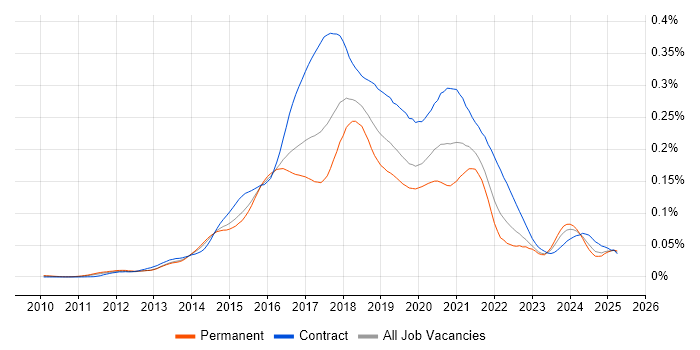Hadoop Distributed File System (HDFS)
UK
The table below provides summary statistics for permanent job vacancies requiring HDFS skills. It includes a benchmarking guide to the annual salaries offered in vacancies that cited HDFS over the 6 months leading up to 30 April 2025, comparing them to the same period in the previous two years.
| 6 months to 30 Apr 2025 |
Same period 2024 | Same period 2023 | |
|---|---|---|---|
| Rank | 664 | 761 | 943 |
| Rank change year-on-year | +97 | +182 | +164 |
| Permanent jobs citing HDFS | 20 | 124 | 44 |
| As % of all permanent jobs advertised in the UK | 0.038% | 0.13% | 0.042% |
| As % of the System Software category | 0.37% | 1.01% | 0.28% |
| Number of salaries quoted | 3 | 2 | 34 |
| 10th Percentile | £77,000 | - | £50,000 |
| 25th Percentile | £83,750 | £29,000 | £51,250 |
| Median annual salary (50th Percentile) | £100,000 | £31,000 | £68,823 |
| Median % change year-on-year | +222.58% | -54.96% | +7.96% |
| 75th Percentile | £112,500 | £33,000 | £100,000 |
| 90th Percentile | £117,000 | - | £125,000 |
| UK excluding London median annual salary | £105,000 | - | £68,823 |
| % change year-on-year | - | - | +19.69% |
All System Software Skills
UK
HDFS falls under the System Software category. For comparison with the information above, the following table provides summary statistics for all permanent job vacancies requiring system software skills.
| Permanent vacancies with a requirement for system software skills | 5,388 | 12,269 | 15,980 |
| As % of all permanent jobs advertised in the UK | 10.33% | 12.48% | 15.37% |
| Number of salaries quoted | 3,933 | 9,741 | 10,518 |
| 10th Percentile | £28,500 | £26,250 | £27,915 |
| 25th Percentile | £36,250 | £32,500 | £37,500 |
| Median annual salary (50th Percentile) | £55,000 | £50,000 | £55,000 |
| Median % change year-on-year | +10.00% | -9.09% | -1.79% |
| 75th Percentile | £78,750 | £67,500 | £77,500 |
| 90th Percentile | £100,000 | £86,000 | £95,000 |
| UK excluding London median annual salary | £47,500 | £45,000 | £47,500 |
| % change year-on-year | +5.56% | -5.26% | -5.00% |
HDFS
Job Vacancy Trend
Job postings citing HDFS as a proportion of all IT jobs advertised.

HDFS
Salary Trend
3-month moving average salary quoted in jobs citing HDFS.
HDFS
Salary Histogram
Salary distribution for jobs citing HDFS over the 6 months to 30 April 2025.
HDFS
Top 6 Job Locations
The table below looks at the demand and provides a guide to the median salaries quoted in IT jobs citing HDFS within the UK over the 6 months to 30 April 2025. The 'Rank Change' column provides an indication of the change in demand within each location based on the same 6 month period last year.
| Location | Rank Change on Same Period Last Year |
Matching Permanent IT Job Ads |
Median Salary Past 6 Months |
Median Salary % Change on Same Period Last Year |
Live Jobs |
|---|---|---|---|---|---|
| England | +182 | 15 | £100,000 | +222.58% | 7 |
| UK excluding London | +116 | 15 | £105,000 | - | 3 |
| Work from Home | +194 | 14 | - | - | 5 |
| South East | +123 | 14 | £105,000 | - | 2 |
| London | +87 | 1 | £75,000 | +141.94% | 5 |
| Northern Ireland | - | 1 | - | - |
HDFS
Co-occurring Skills and Capabilities by Category
The follow tables expand on the table above by listing co-occurrences grouped by category. The same employment type, locality and period is covered with up to 20 co-occurrences shown in each of the following categories:
|
|
|||||||||||||||||||||||||||||||||||||||||||||||||||||||||||||||||||||||||||||||||||||||||||||||||||
|
|
|||||||||||||||||||||||||||||||||||||||||||||||||||||||||||||||||||||||||||||||||||||||||||||||||||
|
|
|||||||||||||||||||||||||||||||||||||||||||||||||||||||||||||||||||||||||||||||||||||||||||||||||||
|
|
|||||||||||||||||||||||||||||||||||||||||||||||||||||||||||||||||||||||||||||||||||||||||||||||||||
|
|
|||||||||||||||||||||||||||||||||||||||||||||||||||||||||||||||||||||||||||||||||||||||||||||||||||
|
|
|||||||||||||||||||||||||||||||||||||||||||||||||||||||||||||||||||||||||||||||||||||||||||||||||||
|
|
|||||||||||||||||||||||||||||||||||||||||||||||||||||||||||||||||||||||||||||||||||||||||||||||||||
|
|
|||||||||||||||||||||||||||||||||||||||||||||||||||||||||||||||||||||||||||||||||||||||||||||||||||
|
||||||||||||||||||||||||||||||||||||||||||||||||||||||||||||||||||||||||||||||||||||||||||||||||||||
